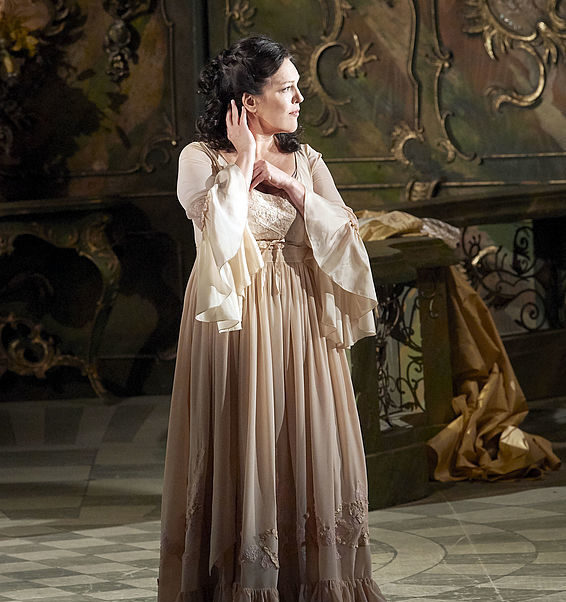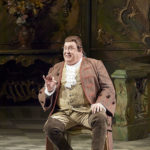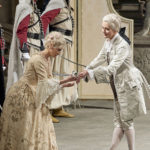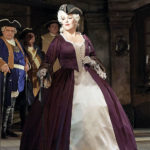 Not only is this the 1000th Der Rosenkavalier at Vienna State Opera, but it’s the 381st using Otto Schenk’s classic staging. The sets are so lavish that no opera house could now afford them. They recreate that timeless, long-gone world of fading aristocracy – fin-de-siecle – before WW1, (the opera premiered 1911). It’s Richard Strauss’s most viennese (wienerisch) opera: his librettist Hugo von Hofmannstal was effectively Viennese, and it’s largely set in Vienna, hence the Faninal’s ‘town house’, a veritable palace. You see ‘marble’ walls with rococo ornamentation in gold-effect; crystal chandeliers; authentic-looking 18th period furniture; much more if you’re facing the stage. The ceiling in Titian blue resembles a renaissance painting.
Not only is this the 1000th Der Rosenkavalier at Vienna State Opera, but it’s the 381st using Otto Schenk’s classic staging. The sets are so lavish that no opera house could now afford them. They recreate that timeless, long-gone world of fading aristocracy – fin-de-siecle – before WW1, (the opera premiered 1911). It’s Richard Strauss’s most viennese (wienerisch) opera: his librettist Hugo von Hofmannstal was effectively Viennese, and it’s largely set in Vienna, hence the Faninal’s ‘town house’, a veritable palace. You see ‘marble’ walls with rococo ornamentation in gold-effect; crystal chandeliers; authentic-looking 18th period furniture; much more if you’re facing the stage. The ceiling in Titian blue resembles a renaissance painting.
In the opening scene, the Marschallin’s bedroom is more like a state room; left-stage tortoise-shell lacquered walls, lavish drapes; and the four-poster bed hung with chintzy curtains; out of which the Marschallin’s (Adrianne Pieczonka) head peers. Octavian is standing, Stephanie Houtzeel’s short, platinum hair, remarkably masculine. Houtseel an experienced Octavian here, regularly cast in ‘trouser’ roles. It’s the same coupling as in 2013, when I was intrigued by the cross-dressing implications – speculating on whether the relationship could be lesbian. (I still wonder.)
‘But when your looks fade where will you be then?’, he asks. At first, like a wilting screen goddess- I always think of Geraldine Page in Tennessee William’s ‘Sweet Bird of Youth’- the Marchallin’s dazzled by the daylight. What day is it: I don’t want the day! The theme is time, finite beauty: she’s getting old and he is very young.
Jede Dinge hat seine Zeit. Everything has its time, and hers is running out. Symbolically, she notices his sword: ‘he left his sword in a lady’s bedroom! ‘Pieczonca, who’s made the role her own, truly inhabits the part: her luscious, rich, dark-chocolate tone, sensual and powerful; the ideal Straussian soprano. But also poignantly moving, unbearably so. ‘I feel the fragility deep in myself’, she sings.
Their morning-after sex is interrupted by the unexpected visit of the Baron Ochs. So Octavian has to hide in the closet- echoes of the Marriage of Figaro, the I8th century Age of Enlightenment, Strauss may have had in mind- and reappears as the servant ‘Mariandel’ This brightens the melancholy, but also ‘Mariandel’ reappears in the denouement to trap the philandering Ochs in a Viennese inn.
 Ochs is a bon vivant, but also a serial womaniser and abuser, as we would say now. In Hofmannsthal’s plot he’s come to announce his engagement to ‘sweet’ Sophie (von Faninal), a titled family he schemes to marry into. Ochs is a figure of fun, but the villain of the piece.
Ochs is a bon vivant, but also a serial womaniser and abuser, as we would say now. In Hofmannsthal’s plot he’s come to announce his engagement to ‘sweet’ Sophie (von Faninal), a titled family he schemes to marry into. Ochs is a figure of fun, but the villain of the piece.
Peter Rose has sung Ochs internationally and reenacts the part as his own. I’d previously thought his impressive bass too smooth for this crude character. But Rose appears fatter (the garish costumes maybe), and his manner more leering, his lust and rapacious appetites barely contained beneath the smooth social manners. So these central episodes – intentionally comic, that I’d once found a little dull- really come to life. He can’t keep his hands off ‘Mirandel’, and pinches her bottom. ‘Once I see something I like I must have it,‘ is his motto.
In the complex plot, Ochs wants Octavian, Sophie’s cousin, to give her away: present her with the ceremonial rose. What I’d not noticed was the ‘horse-trading’ between Ochs and Lord Faninal over Sophie’s dowry, which Ochs is trying to get out of paying. Flavinal (Marcus Eiche) is quite furious, aware who has the upper hand.
Act 2 and the Rosenkavalier presentation. As Sophie, sweet-voiced, lyrical soprano Chen Reiss- elegant, slim- is perfect for this youthful role. Sophie, poor wench, is all excited: not knowing what a brute she’s to expect. She’s being bartered; she’s high-born, he’s buying into title.
Prince Octavian presents the silver rose: its scent like ‘heavenly roses’. She’s under a spell, cast by her Prince Charming. They make eye contact, she’s captivated, confused; love struck. (‘Quinquin’, she calls him, how friends and ‘beautiful ladies’ use to address him.) They are cousins; but she confides, she needs a husband to look after her.  She sings to him, never has a young man delighted her so much. (I have to admit the ceremony was something I’d previously found difficult to understand, off-putting; but, beneath the surface glitter, the pageant is dramatically crucial.)
She sings to him, never has a young man delighted her so much. (I have to admit the ceremony was something I’d previously found difficult to understand, off-putting; but, beneath the surface glitter, the pageant is dramatically crucial.)
The (Act 2) meeting between Sophie and Ochs is inevitably a disaster. The lecherous Ochs eyes her up like a piece of meat. She’s ‘shoulders like a chicken.’ He’s moving too fast and she’s not going there; she’s never been spoken to before like this. Rose’s Ochs is creepier, more menacing – his tight flashy waistcoat accentuating his belly, toad-like.
We hear that the Lerchenau mob (Ochs’ retinue) are drunk and going at the servants ‘ten times worse than the Turks and Croatians’. (No offence, this was composed in 1911). Anyway, Sophie in real danger, is rescued just in time by her Prince, who challenges Ochs , and pricks him with his sword. Ochs overreacts, in the farce, Rose as his if life were threatened. (Servants in the upper gallery are having a good laugh.) So that Faninal- Such a scandal in his town house! – bans Octavian. Faninal, confirming the patriarchal contract, insists his daughter will marry Ochs anyway. Meanwhile Rose exploits the situation: spread out on a chaise-longue, ‘Here I lie: incredible what can happen to a man in Vienna!‘
But Sophie commits herself to be her own woman, and determines with Octavian on revenge. Ochs receives a letter from the servant ‘MariendaL’, and Ochs arranges a rendezvous. ‘Nothing makes him feel young like overcoming stubbornness’; (or rape by another name.)
The Act 3 scam is set in a traditional Viennese Gasthaus- authentically gothic, with waiters and ‘dieners’- but the hospitality rooms have been rigged. The farce to expose Ochs is brilliantly paced. Ogling his prey, Houtzeel’s countrified innocent- Ochs makes his intentions clear: a Gentleman (Cavalier) leaves his manners at the door. Maybe Houtzeel’s gullibility is just a little too exaggerated. Broken promises, and you a bridegroom! The upshot is that Ochs is ambushed by ‘ex-mistresses’, and the stage filled with allegedly illegitimate children. In the pandemonium, the police are called.
 The Marchallin arrives, Pieczonka magisterial in a burgundy cloak and matching hat. Ochs must do the honourable thing and leave. Her ‘Do you not understand when an affair is finished? Quite done with’ has a ring of irony. To the Baron’s favourite waltz- Der Rosenkavalier– the massed crowd see the lecher out.
The Marchallin arrives, Pieczonka magisterial in a burgundy cloak and matching hat. Ochs must do the honourable thing and leave. Her ‘Do you not understand when an affair is finished? Quite done with’ has a ring of irony. To the Baron’s favourite waltz- Der Rosenkavalier– the massed crowd see the lecher out.
Es war nicht mehr als ein Farce, she sings to Oktavian, who is still dependent, a false loyalty, on the older woman. Go to her and do what your heart tells you! The Marschallin sings (to us), ‘Did I not vow to bear it all calmly.’ In this painfully moving, magnificent scene- the high point of the opera- the three protagonists in this love triangle are all singing, expressing their innermost thoughts.
You have come to love him so quickly, she addresses Sophie. Sophie- Reiss self-effacing, unnerved- ‘Mind me, weak thing, that I may fall.’
The Marschallin, to herself, Ich weiss gar nicht, I understand nothing at all. She’s in shock: ‘I vowed to leave him in the right way, so that I would love even his love for another.’ Pieczonca has moved to another part of the stage, her powerful soprano soaring above Strauss’s waves of orchestral emotion. ‘The boy stands there, and I stand here, and he would be happy with that strange girl’. And, enigmatically, ‘that’s how young people are.’
Adam Fischer conducted this 1000th performance, as he has regularly conducted Der Rosenkavalier at Vienna State Opera. Masterfully, in command of Strauss’s highly complex orchestral score -high romanticism, seductively melodic, still surprisingly ‘modern’ after the radical Salome and Elektra. © P.R. 21.03.2019
Photos: Adrianne Pieczonka (Feldmarchallin); Peter Rose (Baron Ochs of Lerchenau); Stephanie Houtzeel (Oktavian), Chen Reiss (Sophie); Adrianne Pieczonca (Marchallin)
© Wiener Staatsoper/ Michael Pöhn
